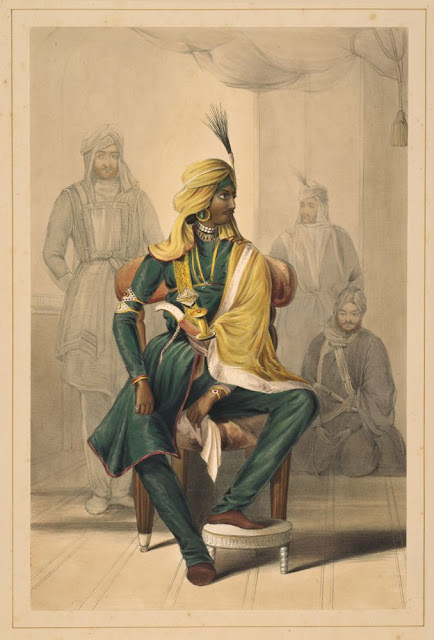BULAKA SINGH, an eighteenth century Sikh musician who recited the holy hymns. He lived in the village of Ghurani. in Ludhiana district. He was once humiliated by the local anathematized group who were the followers of Baba Ram Rai. To avenge the insult, hero and warrior Banda Singh Bahadur sacked the village in 1710. Bulaka Singh was appointed thanedar or police chief of the area.
BUR SINGH (d. 1892). son of Ruldu Ram, appointed to do menial jobs first as an attendant in the household of Maharaja Ranjit Singh`s wife, Rani Mahtab Kaur, and then as a water carrier in Kanvar Sher Singh`s, carried out some of the confidential errands he was assigned to with such great skill that he not only rose in rank but also hadjagirs in Mukerian, and houses at Batala and Lahore bestowed on him. For his assistance to the British on the occasion of General Pollock`s advance on Kabul, he received ajagir near Peshawar. His enemies took advantage of the murder in September 1843 of his master, Maharaja Sher Singh, to harm him.
CLERK, SIR GEORGE RUSSELL (1800-1889), diplomat, son of John Clerk, entered the service of the East India Company as a writer in 1817. After various appointments in Calcutta, Rajputana and Delhi, he became political agent at Ambala in 1831. He was appointed agent to the Governor General at the North-West Frontier Agency in 1840. In this capacity, he shaped British policy towards the Sikhs during the days following the death of Maharaja Ranjit Singh. For almost a decade, as political agent at Ambala, he had been responsible for British political relations with the cis Sutlej states.
DEVA SINGH, SIR (1834-1890), a highranking Patiala state administrator, was born in 1834 into an Arora Sikh family, the son of Colonel Khushal Singh, a brave soldier who had once killed a tiger (sher, in Punjabi) near one of the city gates conferring upon it the name Sheranvala which lasts to this day. Deva Singh received the only formal education available at that time by attending a maktab or Persian school, and entered Patiala state service at a very early age in 1846. In 1853, he was appointed assistant judicial minister and in 1855, a Risaldar in a cavalry unit.
- 1
- 2






